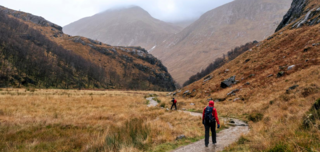Five Things King Charles III Has Done To Protect Our Wild Spaces

It’s no secret that the new King is a passionate defender of our great outdoors. From committing to reducing his own carbon footprint to campaigning for environmental change on a global scale, we take a look at the ways King Charles III has advocated for our wild spaces.

Championed Organic Farming
Back in the 1980s, King Charles started his journey to transform Highgrove, his Gloucestershire estate, into an organic haven. That included limiting use of antibiotics to grow fruit and vegetables as well as making more room for planting trees and wildflowers.
To begin with, some neighbouring farmers were sceptical about his organic approach. But his method turned into a successful business under the Dutchy Organic brand that’s sold in Waitrose.This success story has helped fuel interest in organic farming and encouraged more conversations about alternatives to pesticides that are kinder to our environment.
Launched The Sustainable Markets Initiative
To continue his fight against climate change and biodiversity loss, in 2020 King Charles launched The Sustainable Markets Initiative. Developed with a mission to help the private sector accelerate towards a greener future.
Now, more than 500 CEOs from around the world have pledged their support for the initiative focusing on shifting corporate strategies, reforming global financial systems and attracting positive investment opportunities.
With task forces dedicated to different sectors, it’s a global effort to make change and refocus private business on doing right by the planet, not just profit.
Spoke Up For The Environment At COP26
In 2021, King Charles was a prominent voice at the United Nations Climate Change Conference. Stressing the importance of using this platform as a chance to work together and commit to protecting our planet. Accepting that with the right investment, we could start to limit climate change.
In front of world leaders at the opening ceremony he said “I can only urge you, as the world’s decision-makers, to find practical ways of overcoming differences so we can all get down to work, together, to rescue this precious planet and save the threatened future of our young people.”

Worked To Reduce His Personal Carbon Footprint
While King Charles has highlighted the impact global change can have, he’s continued to promote how small changes we make in our everyday lives can add up to a big difference too.
This is something the King has personally demonstrated by striving to reduce his own impact on our planet. That includes running his farm and house on 90% renewable energy, half of which is developed on-site from solar panels, heat pumps and biomass boilers.
His 50 year old Aston Martin has also been converted to run on bioethanol created with surplus English white wine and whey from the cheese-making process. Making use of waste materials and moving away from fossil fuels.
Patron of The Campaign for Wool
As the Prince of Wales, Charles also helped launch the Campaign for Wool. Educating consumers about the natural benefits of wool, a material that biodegrades so it doesn’t accumulate in landfill.
Importantly, wool biodegrades in soil and water, meaning it actively adds nutrients back to our environments rather than damaging them.

From these examples alone it’s clear that the new monarch’s dedication to our planet runs deep, helping to ensure the landscapes we love continue to thrive for generations.
We’ll be celebrating the Coronation of King Charles III throughout our business and in our Central London stores this weekend. Why not stop by to learn more about how we’re protecting our environment and find conscious kit for your next outdoor adventure.
Related Articles

Let us know you agree to cookies
We use marketing, analytical and functional cookies as well as similar technologies to give you the best experience. Third parties, including social media platforms, often place tracking cookies on our site to show you personalised adverts outside of our website.
We store your cookie preferences for two years and you can edit your preferences via ‘manage cookies’ or through the cookie policy at the bottom of every page. For more information, please see our cookie policy.

